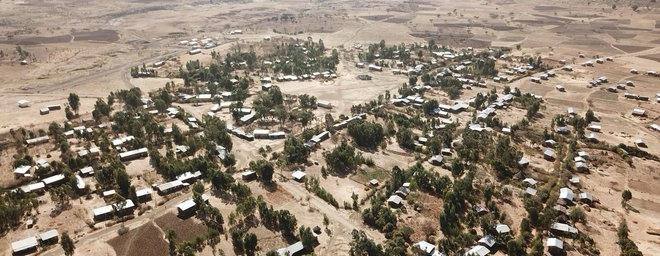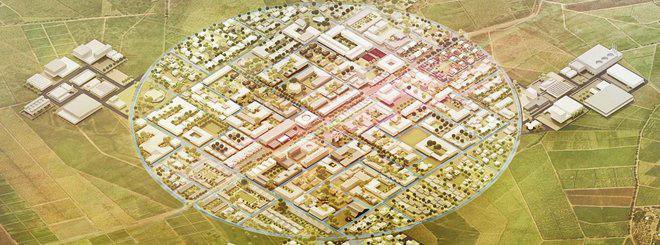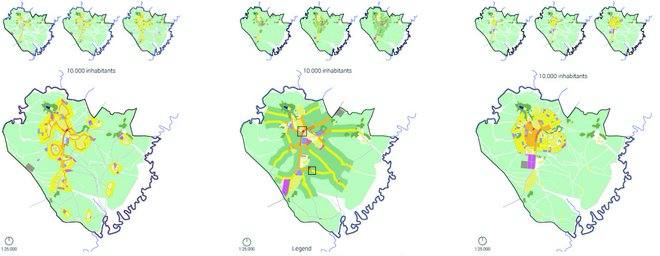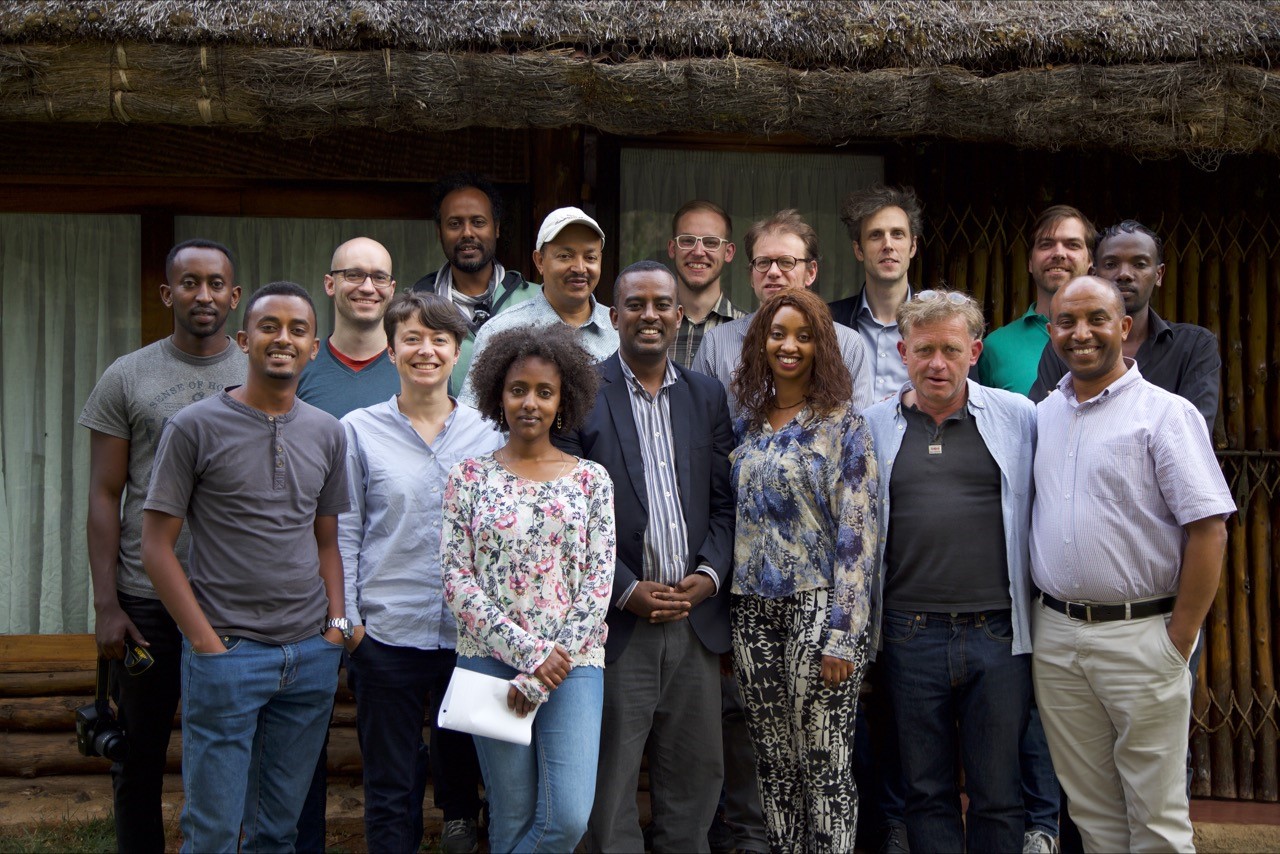Integrated Infrastructure - Towards a Planning Strategy for Emerging Cities in Ethiopia
Funded by German Federal Ministry of Education and Research (BMBF), 2017 - 2020
Integrated Infrastructure (IN3) is an interdisciplinary research and teaching project that connects urban planning, water infrastructure and computer science. It is aimed at developing innovative tools to support the planning of cities in Ethiopia. An example of this is the ‘Planning and Participation Platform’.
The background of the project is the rapid urbanization of Ethiopia, particularly its rural context. It is estimated that in the following five to ten years, several thousand new cities will need to be created in Ethiopia. The planning of these cities is a challenging task owing to the complex nature of cities. Thus thousands of physical elements need to be arranged carefully in order to serve numerous human needs and to respect multiple ecological and economical boundary conditions. In addition to the complex nature of the planning task itself, Ethiopia lacks well-educated planners.
In this project we are developing an integrated planning strategy (IPS to support planners in the creation of sustainable and resilient spatial urban structures. In doing so, we are focusing (1) on the layout of the street network, parcellation, building footprints and land use – design parameters which have a long lasting impact on the social, economic and ecological performance of a city – and (2) on water infrastructure as the main driver of urban development („water-based urban planning“).
The IPS helps to define these parameters by rapidly generating planning scenarios and providing feedback on the performance of these scenarios. Not only does it speed up the time-consuming work of planners, it also provides insight into the effects of planning decisions. This, in turn, can help citizens to participate in the planning of their city.

Tukuls to Dachas (T2D)
In 2013 – 14, Dirk Donath, Lukas Veltruský (viertewand), Florian Geddert (plus 4930 Architektur) , Tsedeke Yihunie Woldu and his Sustainable Urbanization Team within Flintstone Engineering SC, developed a conceptual scheme for the creation of small dense urban settlements in the rural areas of Ethiopia. The idea behind this project was to reduce the massive flow of people to the big cities by creating a livelihood where most of the Ethiopian population currently lives – in the rural areas.
Since less people are needed in the agricultural sector, incentives for secondary and tertiary industry must be made. To create places which foster such a development is one of the main goals of the Tukuls to Dachas (T2D) project. It is an integrated urban development model, combining efficient transport and water infrastructure and an urban layout promoting walkability, friendly inner-city development and flexibility for the many different economic activities (from large production to small backyard workshops). The circular street around the city shall keep the noisy through traffic out of the city center and define a boundary for avoiding horizontal growth in order to secure valuable land for food production.
The concept note was further surveyed and elaborated into official research proposal by Tsedeke Yihunie, Mehary Girma and Wubshet Tesfaye; and was presented to the Ethiopian government and received lot of attention, leading to the integration of the small-town development in the countries' Growth and Development Plan II from 2015. It stipulates the development of plans for 8,000 rural centers and the establishment of urban centers to implement these development plans until 2020.
Flintstone Engineering’s Sustainable Urbanization wing started formal socio-economic profiling, physical analysis, adapting the idealized T2D-scheme to the actual conditions and subsequent planning of 13 model towns in early 2018. Under extensive personnel efforts and heavy necessary persuasion work, in May 2019 the final plans and research proposals for 12 Kebeles - towns with 3,500 to 4,000 inhabitants – have been presented to respective town inhabitants out of which six have been approved by their lawful councils. The remaining are undergoing the approval procedure, two further towns have just been successfully approved for implementation by the council and are to be realized from September 2019 on. A model research proposal of one of the small towns, produced in the official language of the country, is accessible here.
In the research project IN³ Integrated Infrastructure, the plans for these cities are used as test cases for the development of new computer-based planning methods.
ከጎጆ_ቤት_ወደ_ገጠር_መናፈሻነት_ኸረጥ_አጋምማ.pdf

INUMO
Integrated Urban Mobility – Digital Methods for Interactive Scenario Development of Sustainable Traffic Infrastructure for Emerging Cities in Ethiopia.
Network Project between Bauhaus-Universität Weimar & Ethiopian Institute of Architecture, Building Construction and City Development (EiABC) Funded by German Federal Ministry of Education and Research (BMBF), 2021 - 2024
The integration of sustainable mobility concepts into urban planning is particularly important in the context of Sub-Saharan Africa and Ethiopia in particular. At present the proportion of private motorized transport is still very low, and given the large number of cities and urban districts that will be planned in the near future, there is a unique chance to leapfrog common urban development failures of the past and establish more sustainable transport solutions to create cities characterized by short distances, healthy air and an improved CO2 balance.
The overall goal of this project is to leverage the potential of digital methods for sustainable urban mobility planning in Ethiopia. Through this project, the diverse knowledge of various disciplines can be digitally represented and made available to all, planning proposals can be generated automatically and analyzed quickly with regard to numerous aspects (land consumption, walkability, energy demand, etc.), future scenarios can be simulated, and the participation of various interest groups can be promoted through interactive visualizations.
The project takes an interdisciplinary approach across the fields of traffic planning, computer science and urban planning. It is designed as a feedback loop of method development and application and interlinks education directly to research and vice versa. Stakeholder workshops will serve as an interface for training and to raise awareness of the interdisciplinary approaches for potential users.

Integrated Infrastructure
Integrated Infrastructure (In³) is an interdisciplinary international research project at the Bauhaus-Universität Weimar (BUW) and the Ethiopia Institute for Architecture, Building Construction and City Development (EiABC). The main objective of Integrated Infrastructure is to create knowledge, tools, and networks for establishing high-quality, interdisciplinary, cross-continental research and education on planning and building of resilient cities in Ethiopia and Germany. Starting from the premise that the technical infrastructure (water, energy, transport) acts as a main driver for spatial and thus also social developments, we focus on the development and implementation of an integrated planning strategy (IPS), that helps to anticipate the technical infrastructure in the planning and implementation of spatial structures (buildings, streets, lots, public spaces) in the best possible manner.
The IPS connects technical infrastructure with architectural and urban spatial planning via three components, namely Technology, Simulation and Participation. The short title of the project – IN³ – shall reflect the integrative interplay of the three components. In particular, Technology (T) refers to adaptable, robust and resource efficient technological solutions, Simulation (S) to computational models for predicting urban developments and Participation (P) to broad stakeholder participation for fostering bottom-up initiatives. By developing well-attuned interfaces between these three components we are creating a robust framework for the planning of emerging cities, since the better these interfaces work, the more effective an iterative improvement process can take place. The more effective the improvement process, the better the whole systems (building, city, infrastructure) abililty is to learn and adapt to changing situations.
Furthermore, this project encourages and support interested doctoral candidates from Ethiopia and Germany to participate in the project with a PhD Thesis. We would strongly support their application at scholarship programs like the PhD scholarship programs at DAAD like In-Country/In-Region Scholarships, Eastern Africa or the home grown sandwich program from MoE in Ethiopia.

ECL-AA and Bauhaus University Weimar team